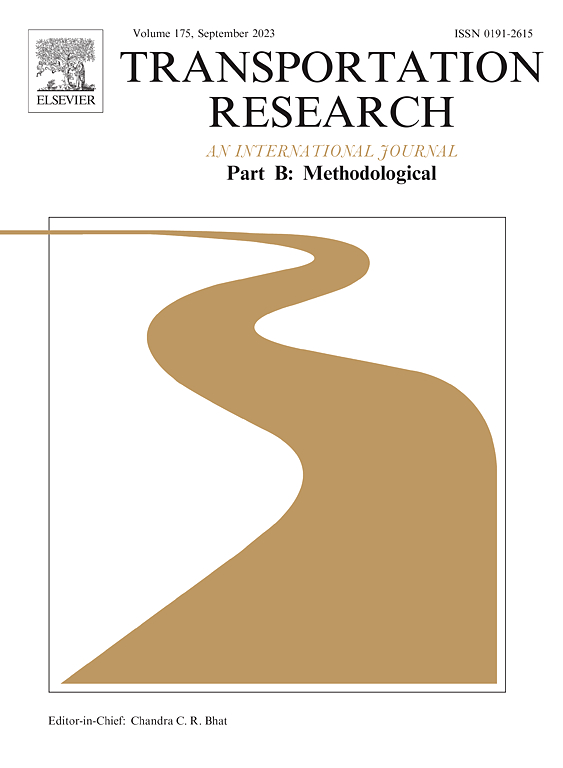Real-time vehicle relocation, personnel dispatch and trip pricing for carsharing systems under supply and demand uncertainties
IF 6.3
1区 工程技术
Q1 ECONOMICS
引用次数: 0
Abstract
In one-way carsharing systems, striking a balance between vehicle supply and user demand across stations poses considerable operational challenges. While existing research on vehicle relocation, personnel dispatch, and trip pricing have shown effectiveness, they often struggle with the complexities of fluctuating and unpredictable demand and supply patterns in uncertain environments. This paper introduces a real-time relocation-dispatch-pricing (RDP) problem, within an evolving time-state-extended transportation network, to optimize vehicle relocation, personnel dispatch, and trip pricing in carsharing systems considering both demand and supply uncertainties. Furthermore, recognizing the critical role of future insights in real-time decision making and strategic adaptability, we propose a novel two-stage anticipatory-decision rolling horizon (ADRH) optimization framework where the first stage solves a real-time RDP problem to make actionable decisions with future supply and demand distributions, while also incorporating anticipatory guidance from the second stage. The proposed RDP problem under the ADRH framework is then formulated as a stochastic nonlinear programming (SNP) model. However, the state-of-the-art commercial solvers are inadequate for solving the proposed SNP model due to its solution complexity. Thus, we customize a hybrid parallel Lagrangian decomposition (HPLD) algorithm, which decomposes the RDP problem into manageable subproblems. Extensive numerical experiments using a real-world dataset demonstrate the computational efficiency of the HPLD algorithm and its ability to converge to a near-globally optimal solution. Sensitivity analyses are conducted focusing on parameters such as horizon length, fleet size, number of dispatchers, and demand elasticity. Numerical results show that the profits under the stochastic scenario are 18 higher than those under the deterministic scenario, indicating the significance of incorporating uncertain and future information into the operational decisions of carsharing systems.
供需不确定条件下汽车共享系统的实时车辆迁移、人员调度和行程定价
在单向汽车共享系统中,在车站之间实现车辆供应和用户需求之间的平衡带来了相当大的运营挑战。虽然现有的关于车辆重新安置、人员派遣和出行定价的研究已经显示出有效性,但在不确定的环境中,它们往往难以应对波动和不可预测的需求和供应模式的复杂性。本文在考虑需求和供给不确定性的情况下,在一个不断发展的时间状态扩展交通网络中,引入实时迁移-调度-定价(RDP)问题,以优化汽车共享系统中的车辆迁移、人员调度和出行定价。此外,认识到未来洞察在实时决策和战略适应性中的关键作用,我们提出了一个新的两阶段预期-决策滚动地平线(ADRH)优化框架,其中第一阶段解决实时RDP问题,以根据未来的供需分布做出可操作的决策,同时还纳入了第二阶段的预期指导。然后将ADRH框架下的RDP问题表述为随机非线性规划(SNP)模型。然而,由于其解决方案的复杂性,最先进的商业求解器不足以解决所提出的SNP模型。因此,我们定制了一种混合并行拉格朗日分解(HPLD)算法,该算法将RDP问题分解为可管理的子问题。使用真实数据集的大量数值实验证明了HPLD算法的计算效率及其收敛到接近全局最优解的能力。对地平线长度、车队规模、调度员数量和需求弹性等参数进行了敏感性分析。数值结果表明,随机情景下的利润比确定性情景下的利润高18%,说明了将不确定性和未来信息纳入汽车共享系统运营决策的重要性。
本文章由计算机程序翻译,如有差异,请以英文原文为准。
求助全文
约1分钟内获得全文
求助全文
来源期刊
CiteScore
12.40
自引率
8.80%
发文量
143
审稿时长
14.1 weeks
期刊介绍:
Transportation Research: Part B publishes papers on all methodological aspects of the subject, particularly those that require mathematical analysis. The general theme of the journal is the development and solution of problems that are adequately motivated to deal with important aspects of the design and/or analysis of transportation systems. Areas covered include: traffic flow; design and analysis of transportation networks; control and scheduling; optimization; queuing theory; logistics; supply chains; development and application of statistical, econometric and mathematical models to address transportation problems; cost models; pricing and/or investment; traveler or shipper behavior; cost-benefit methodologies.

 求助内容:
求助内容: 应助结果提醒方式:
应助结果提醒方式:


